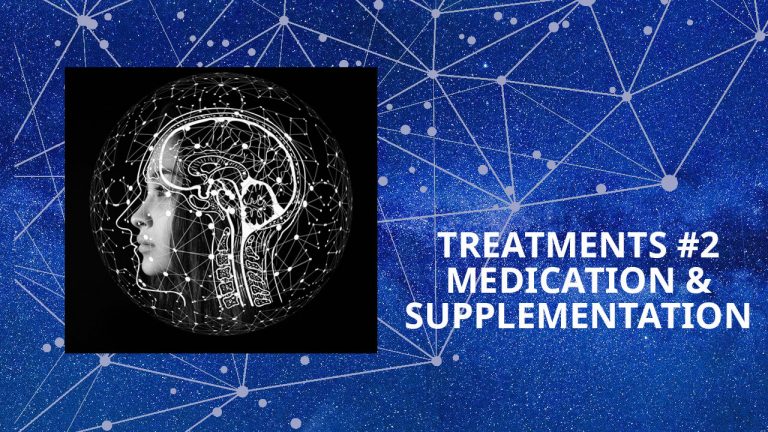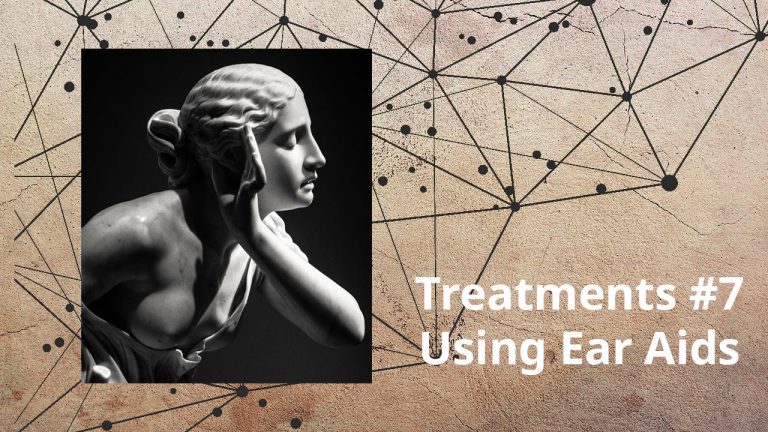Medication and Supplementation
When we want to treat a disease or a malfunction of the body, we think first of drugs. Here we will review the main drug treatments, before talking about supplementation treatments, or dietary supplements, and we will end with a few words about Hopeopathy.

Medication 1 : The drug treatments
Corticosteroids
When a tinnitus often associated with a more or less profound deafness appears abruptly, after an accident or an acute sound trauma for example, corticosteroids associated or not with vasodilators may be prescribed for a short time.
A corticosteroid treatment is never trivial.
So this can only be a very short-term solution and it is considered that the treatment must be implemented quickly (within 48 hours maximum), to give the best chance of recovery from hearing and limit tinnitus.
Anxiolytics
Anxiolytics, which are, as their name suggests, substances intended to combat anxiety and stress, are sometimes prescribed when the first tinnitus symptoms occur.
It should be made clear that they do not treat it but can only provide one-time help to combat the psychological effects.
They will thus help to reduce the level of anxiety felt.
In all cases, these addictive drugs should not be used in the long term.
Examples include: Lexomil, Temesta, Xanax among others.
Antidepressants
We move into the top category with anti-depressants.
These powerful molecules are of course useful for treating depression.
But according to a study published in August 2017 by researchers at Oregon Health & Science University, antidepressants could aggravate subjective tinnitus.
These psychotropic drugs would accentuate the effects of serotonin in the brain.
However, the neurons involved in the transmission of sound messages would be excited by the amplification of the action of serotonin.
This would have the side effect of worsening the subjective tinnitus in the patients concerned.
It must also be taken into account the risks of addiction so their use must be limited and always placed under the control of the prescriber.
Most famous: Prozac, Laroxyl, Deroxat, Zoloft.
As we can see, these two large families of drugs, which may be useful for the psychological effects induced by tinnitus, do not in any way solve the source of the problem.
They should therefore be used, only on medical advice, with caution and for a limited time.
The anti-epileptic
According to some studies, an antiepileptic given in very small doses will act as an analgesic at the cerebral level. This would lead to an improvement in the perception of tinnitus.
These trials need to be confirmed by further studies.
Dopamine regulators
According to serious scientific studies, dopamine and serotonin play an important role in the perception of tinnitus, as well as in the feeling of chronic pain. The same areas of the brain would be involved in these abnormal sensations.
Tinnitus and chronic pain apparently occur when these systems are compromised and the brain receives wrong information.
This discovery opens the door to possible therapies, since these neural systems depend on the transmission of dopamine and serotonin between neurons. Drugs regulating these neurotransmitters could then be useful.

Medication 2: Supplementation
This is to remedy with one or more dietary supplements any deficiency problems that could affect hearing.
It seems obvious to have to work first to have a healthy life and a balanced diet to avoid deficiencies.
This type of treatment is not reasonably risky.
One can be tempted to put the assets on one’s side by making reasonable targeted contributions.
This can be part of the range of treatments that can be put in place to act on the tinnitus on several levels.
We will develop the following, which are the most cited regarding the treatment of tinnitus:
The Gingko Biloba
vitamin B12
the Lecithine
the Zinc
the Magnesium,
The Melatonin.
The Ginkgo Biloba
Native to southern China, and used in Chinese medicine for millennia, ginkgo biloba has a neuroprotective action.
It is a tree well known for its benefits not only on the brain and memory but also regarding blood circulation disorders.
Its leaves are used to treat symptoms of senile dementia, memory loss, depression, concentration and alertness disorders, headaches and tinnitus.
This form of supplementation sometimes uses the joint action of other substances to optimize the effectiveness of treatment. Examples include valerian root, calcium ascorbate or a vitamin B complex.
Vitamin B12
Also known as cobalamin, vitamin B12 is one of eight B vitamins.
It is essential to the normal functioning of the brain.
It participates in the synthesis of neurotransmitters in the nervous system.
It is also essential for maintaining the integrity of the nervous system and especially the myelin sheath that protects the nerves and optimizes their functioning as well as for the formation of blood.
It is normally involved as a cofactor in the metabolism of each of the cells of the human body, more particularly in the synthesis of DNA and its regulation as well as in the synthesis of fatty acids and in the production of energy.
A scientific study carried out in the United States on more than 100 people with tinnitus showed that nearly half of them had vitamin B12 deficiency.
All this pleads for the victims of tinnitus to ensure that they are not lacking this element.
Vitamin B12 is mainly found in foods of animal origin: offal, seafood, meat, fish, eggs and dairy products.
.
The Lecithin
Lecithin is essential for the proper functioning of the brain, nervous system, cardiovascular system, liver and several other vital organs.
Because of its supposed positive effects on the nervous system, it is given beneficial virtues concerning tinnitus.
It is so essential that the organism must absolutely manufacture it.
But the body does not always have the basic nutrients, in adequate proportions, to ensure a good production of lecithin.
Our body needs quality lecithin, and the best food source is egg yolk, then soybeans and sunflower seeds.
It is therefore important to ensure by an adequate diet and possibly a targeted intake not to miss this key element.
The Zinc
Zinc is a trace element involved in many enzyme reactions.
It also plays an important role in the metabolism of proteins, carbohydrates and fats.
We finally lend it anti-inflammatory and anti-oxidant virtues.
All this suggests that zinc is likely to act positively on tinnitus.
The foods richest in zinc are seafood, offal, meat and cheese. Then there are nuts, unrefined cereal foods, eggs and pulses.
Beware,above 15 mg a day, it can also have harmful consequences on health.
Magnesium
Magnesium is an essential mineral for the proper functioning of the human body.
It participates in more than 300 metabolic reactions: lipid metabolism, regulation of blood sugar and blood pressure. It works in close association with sodium, potassium and calcium, with which it must remain in balance in the body.
It contributes in particular to nervous transmission and muscle relaxation after contraction
Magnesium deficiency can generate many harmful manifestations such as anxiety, fatigue, or digestive disorders. Tinnitus is also one of the symptoms potentially associated with magnesium deficiency.
Legumes, seeds, nuts, whole grains, wheat germ, dark green leafy vegetables and brewer’s yeast are good sources of magnesium.
Melatonin
Melatonin is a hormone involved in sleep.
It is called the sleep hormone because it is released by the body at times corresponding to natural sleep.
But as the body ages, it synthesizes less, leading to sleep disorders.
From then on, a daily compensatory intake of 1 mg, at bedtime, is known to promote sleep.
This can only benefit tinnitus patients.
Homeopathy
In the range of possible treatments, homeopathy occupies a special place.
When we talk about homeopathy, we often find two clans, the convinced, and the skeptics.
So how to explain the claimed success of this treatment in some patients with chronic tinnitus? The convinced will tell you that it works, and the skeptics will say that it is the placebo effect combined with other external factors that have brought about the improvement.
We will not rule on this debate and let everyone judge what is good for them.
And as said in a previous post, a multi-therapeutic approach always has good.
It will naturally be up to the homeopath to analyze the situation and propose the appropriate treatment.
CHININUM SULFURICUM is “the” common remedy for ringing and dizziness in homeopathy but it may or may not be associated with others, such as NATRUM SULFURICUM, GRAPHITES, or CHAMOMILLA VULGARIS …
Each substance whose name is written in Latin is followed by a number 5, 7, 9, 15, 30 and two letters CH. The figure gives the degree of dilution, 30 being the most diluted.
In conclusion of this article about medication & supplementation, we will say:
• drug treatments for tinnitus should be kept to a minimum.
• On the other hand, there is no objection to the introduction of targeted supplements for elements with known or supposed beneficial properties for the relief of tinnitus.




